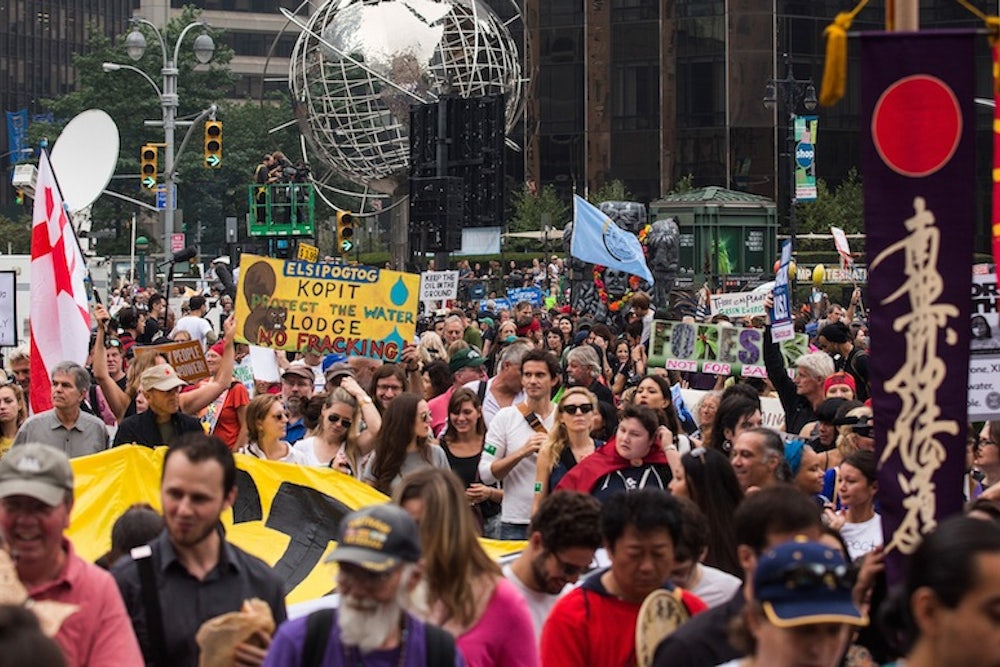Tuesday informally kicks off a critical 15 months in climate change policy. That's when the United Nations Climate Summit—the largest gathering yet of world leaders on climate change—convenes in New York City. The one-day summit is a time for business leaders, heads of state, and NGOs to give speeches affirming the urgency of the crisis—and to make promises about what they intend to do about it.
Officially, Tuesday's summit is not part of the formal negotiations taking place over the next year, as part of the United Nations Framework Convention on Climate Change. Those negotiations will culminate with international climate talks in Paris, in the fall of 2015—and, if environmentalists get their way, some kind of binding global agreement that reduces greenhouse gases at a significant rate.
Unofficially, Tuesday's summit is an indicator of how ready the world is to take action—five years after major polluters left Copenhagen without a binding treaty. And so far there are some worrisome signs.
One highlight of the summit was supposed to be the announcement of pledges to the Green Climate Fund—a pot of money that will help less developed and less wealthy countries fight climate change. But the new fund looks like it will fall short of the $15 billion it's supposed to have. Germany has been the only developed economy to offer a commitment as large as $1 billion, bringing the total pledges to under $2 billion. "I don't want to confirm the pessimism," UN Secretary General Ban Ki-moon's spokesman Stéphane Dujarric said on Sunday. "So let's wait and see what happens."
Among the 120-plus heads of state and lower ranking officials going to the summit, the two countries everyone is watching closely are China and India—the world's first and third biggest polluters. It's also possible they will have little new news to report: Neither of India or China's leaders—President Xi Jinping and Prime Minister Narendra Modi—will be attending the summit themselves, sending high-level representatives in their place. It's not clear yet just what new policies China and India might propose. India has hinted there won't be much.
UN Climate Chief Christiana Figueres stressed that it is "not critical who delivers the message but what the message is." But there's more to be discouraged about then a few no-shows. Several recent comments made by Modi suggest little commitment to global warming, by implying it is a natural phenonemon. “We should also ask is this climate change or have we changed. We have battled against nature. That is why we should live with nature rather than battle it,” Modi said, in a departure from stronger remarks on climate action Indian officials made in 2011.
Still, optimists can point to other signs. The U.S. heads in with additional commitments to fighting global warming, including a formal announcement from President Barack Obama the U.S. is phasing out hydrofluorocarbons in refrigerators and air conditioners, which contribute to global warming. Carbon pricing is gaining momentum, and the World Bank will unveil a list of 230 companies and almost 30 governments that have agreed to set an internal price on carbon that's high enough to actually lower its investments in emissions. And cities, which account for 70 percent of global emissions, may be taking even more aggressive steps where national leaders are not. New York, Boston, San Francisco, and Stockholm are among the cities pledging to cut pollution by 2050.
So when will we know for sure whether this summit was a success? Not right away, alas. In March, countries are due to voluntarily announce what they are willing to contribute in greenhouse gas cuts at the national level—setting the stage for the Paris negotiations in late 2015. And Figueres, for one, remains optimistic. "All large economies are well into the work" of developing emissions targets and "middle sized economies are also doing their homework," she said. "I think most countries will come forward in March."
